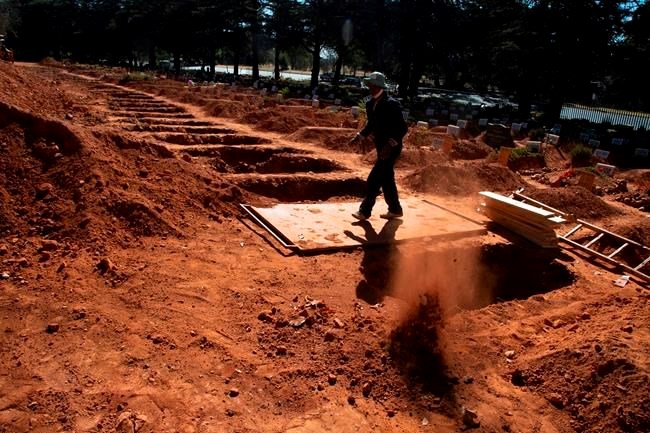PROMACHONAS, Greece — Countries around the world are reimposing lockdowns and implementing new health checks at their borders in an effort to curb a resurgence of the coronavirus before it spins even further out of control.
Starting Wednesday, all
Romania’s president, citing the rising number of infections, announced Wednesday a 30-day extension for the nationwide state of alert. Measures include the mandatory wearing of face coverings on public transportation and in shops, while restaurants may only serve customers in outdoor locations. The country set a record for new infections on Saturday.
Residents of Australia’s second-largest city, Melbourne, were warned on Wednesday to comply with lockdown regulations or face tougher restrictions. Melbourne’s 5 million people and part of the city’s semi-rural surroundings are a week into a new, six-week lockdown to contain a new outbreak there.
“The time for warnings, the time for cutting people slack, is over,” Victoria state Premier Daniel Andrews said. “Where we are is in a very serious and deadly position.”
The developments come with more than 13 million cases of coronavirus cases confirmed worldwide, and with over 578,000 deaths, according to a tally by Johns Hopkins University.
The actual numbers are thought to be far higher due to a number of reasons including limited testing.
In Serbia, which has been hit hard by a spike in infections and anti-government protests, a government crisis team expanded a ban on gatherings of more than 10 people from Belgrade to encompass the entire country. Masks were also made mandatory in public spaces where there is no opportunity for 1.5
Renewed restrictions took effect in Hong Kong on Wednesday, with public gatherings limited to four people, restaurants restricted to takeout after 6 p.m., and a one-week closure for gyms, karaoke bars, and selected other businesses. Masks were mandated on public transit for the first time, with the non-compliant being fined.
After a surge in daily infections beginning last month, Israel moved last week to reimpose restrictions, closing events spaces, live show venues, bars and clubs. It has imposed lockdowns on areas with high infection rates, which in some cases sparked protests from residents.
Officials warn that if case numbers don’t come down in the coming days, Israel will have no choice but to lock the entire country down again, as it did in the spring.
“I don’t see what other tools we have aside from a lockdown,” Israeli Health Minister Yuli Edelstein told the Israeli news site Ynet. “Unless there is a miracle.”
South Africa, Africa’s most developed country, is already showing signs of being overwhelmed by the pandemic — an ominous outlook for the rest of the continent of 1.3 billion people.
A ban on alcohol sales and a night curfew have been reimposed this week to reduce the volume of trauma patients to hospitals that are struggling to cope with an influx of COVID-19 patients.
Alcohol-related emergencies at hospitals dropped by nearly 60% when South Africa prohibited the sales of liquor in April and May. When that restriction was lifted in June, hospitals saw an immediate return to previous levels of trauma cases, especially on weekends, according to statistics from Health Minister Zwelini Mkhize.
One result was more economic pain in a country which already has a high unemployment rate of 30%.
“This return to the booze ban is causing havoc to the restaurant business, and it’s causing people to lose jobs,” said Gerald Elliot, owner of a popular Johannesburg restaurant, Ba Pita, which he said closed as a result of the restrictions, with a loss of 28 jobs. “You can look down our street and see several restaurants that are shut. It looks like they are closed permanently.”
Concerns exist even in locations that have not experienced outbreaks. A World Health Organization delegation visiting Turkmenistan, a country that has not reported any coronavirus infections, recommended tha the country take stronger actions.
In Spain, authorities in the northeastern Catalonia region made fresh attempts to stem the spread of new coronavirus outbreaks as health experts warned that more and better contact tracing is needed.
Since midnight Tuesday, 160,000 residents in and around the city of Lleida were forbidden to leave their homes unless it’s properly justified. The area is closed off, with police checkpoints outside every municipality. Bars and restaurants are only open for takeout or delivery.
In Hospitalet de Llobregat, a densely populated town on the outskirts of the regional capital, Barcelona, dozens of people lined up Tuesday at a local health
Starting Wednesday, three
Authorities in the English town of Blackburn also imposed new restrictions on social mingling amid what they say is a “rising tide” of new coronavirus cases.
Director of Public Health Dominic Harrison said that if infection numbers didn't fall by July 27, officials would begin to reimpose lockdown measures such as the closing of shops and other businesses.
Tokyo Gov. Yuriko Koike said Wednesday that the spread of the infections in the Japanese capital have escalated to levels tantamount to “issuing an alarm” and requested that residents and business owners step up their preventive measures.
However, even as new restrictions are imposed, steps were being taken to help restore a sense of normalcy.
On Tuesday night, Belarusian Prime Minister Roman Golovchenko announced reopening the border with Russia and resuming the transport connection between the two countries “in the coming days.”
____
AP reporters around the world contributed to this report.
Costas Kantouris, Vanessa Gera And Rod McGuirk, The Associated Press




